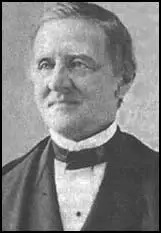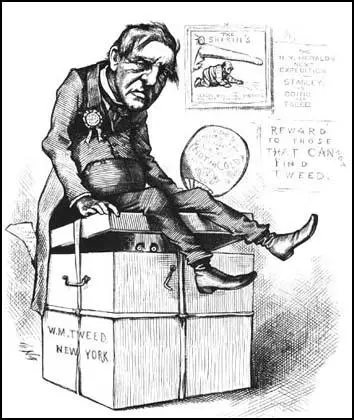Samuel Tilden

Samuel Tilden was born in New Lebanon on 9th February, 1814. He studied law at Yale University and after being admitted to the bar in 1841 became corporation counsel for New York City. A member of the Democratic Party, he was elected to the New York Assembly in 1846. During the American Civil War he was politically inactive but urged Democrats to remain loyal to Abraham Lincoln, the elected president.
In 1866 Tilden became party chairman of New York's Democratic Party. Tilden was criticized by Thomas Nast of Harper's Weekly for tolerating the corrupt activities of William Tweed, the political boss of the city. Tilden was initially reluctant to get involved in the campaign against Tweed but in 1871 he agreed to established a committee to look into the matter. This eventually led to Tweed being arrested and imprisoned for corruption.
In 1874 Tilden was elected governor of New York and two years later, was the Democratic nominee for the presidency. During the campaign, his former ally against Tweed, Thomas Nast, produced a series of cartoons attacking him. This helped to undermine the Democrats campaign but early returns suggested a Tilden victory and the first Democratic president since the American Civil War. When the votes were counted Tilden (4,284,757) had won 51% of the vote, against 48% for his Republican opponent, Rutherford Hayes (4,033,950).
After the election the Republican Party challenged the validity of the voting in South Carolina, Florida and Louisiana. These three southern states were still under post-war military occupation, and over the next few days votes for Tilden were disqualified shifting the majority to Hayes. Members of the Democratic Party were furious and many refused to accept the new voting figures. Florida sent two rival sets of electors to the electoral college and left it to Congress to decide who should become president.
Congress was itself split with the Senate being controlled by Republicans and the House of Representatives by the Democrats. In an attempt to solve the problem both houses agreed to set up a special Electoral Commission of 15 senators, representatives and supreme court justices. In an attempt to produce a non-partisan decision, it was agreed to appoint seven Republicans, seven Democrats, and one independent justice to the commission. However, at the last moment the independent justice was offered a senate seat in Illinois and was replaced by a supporter of the Republican Party.
During the investigation by the commission some voters claimed they had been physically intimidated during the election. The committee also discovered several cases of fraud including attempts to destroy ballot papers. However, at the end of the investigation, all members of the commission voted on party lines and Hayes was given the electoral votes for all three states. Hayes was therefore elected with 185 electoral votes to Tilden's 184.
Leaders of the Democratic Party continued to challenge the election result. Further negotiations took place and it was eventually agreed that Samuel Tilden would accept the result in return for federal troops being removed from southern states. This decision enabled the whites to regain the political control of the South that they had lost at the end of the American Civil War. In most of these states Black Codes were reintroduced and a large percentage of African Americans lost the right to vote in future elections.
Samuel Tilden died on 4th August, 1886. He left most of his $6 million estate to help the establishment of a free public library in New York City.

Harper's Weekly (9th September, 1876)
Primary Sources
(1) Samuel Tilden, speech on the Republican Party at a meeting of the Democratic Party in New York (11th March, 1868)
A complete and harmonious restoration of the revolted states would have been effected if the Republican Party had not proved to be totally incapable of acting in the case with any large, wise, or firm statesmanship.
A magnanimous policy would not only have completed the pacification of the country but would have effected a reconciliation between the Republican Party and the white race in the South. Every circumstance favored such a result. The Republican Party possessed all the powers of the government, and held sway over every motive of gratitude, fear, or interest. The Southern people had become thoroughly weary of the contest; more than half of them had been originally opposed to entering into it, and had done so only when nothing was left to them but to choose on which side they would fight.
All that was necessary to heal the bleeding wounds of the country and to allow its languishing industries to revive, was that the Republican Party - which boasts its great moral ideas and its philanthropy - should rise to the moral elevation of an ordinary pugilist and cease to strike its adversary after it was down.
